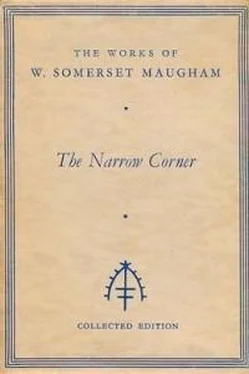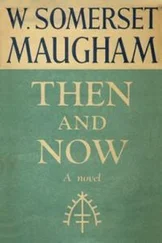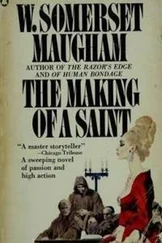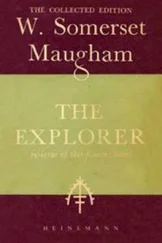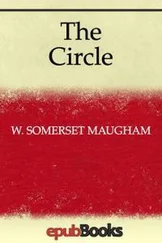He clicked his heels, shook hands with the doctor and Fred, and stumped somewhat heavily away.
IN that hot country not much time was permitted to pass between a person’s death and his burial, but in this case the examination had to be conducted, and it was not till latish in the afternoon that the funeral took place. It was attended by a few Dutch friends of Erik, Frith and Dr. Saunders, Fred Blake and Captain Nichols. This was an occasion after the skipper’s heart. He had managed to borrow a black suit from an acquaintance he had made on the island. It did not fit very well, since it belonged to a man both taller and stouter than he, and he was obliged to turn up the trousers and the sleeves, but in contrast with the others, clad in nondescript fashion, it produced a satisfactory effect of respectability. The service was conducted in Dutch, which seemed to Captain Nichols a little out of place, and he could not take part in it, but there was much unction in his deportment; and when it was over he shook hands with the Lutheran pastor and the two or three Dutch officials present as though they had rendered him a personal service, so that they thought for a moment he must be a near relative of the deceased. Fred wept.
The four Britishers walked back together. They came to the harbour.
“If you gentlemen will come on board the Fenton ,” said the skipper, “I’ll open a bottle of port for you. I ’appened to see it in the store this mornin’, and I always think a bottle of port’s the right thing after a funeral. I mean, it’s not like beer and whisky. There’s somethin’ serious about port.”
“I never thought of it before,” said Frith, “but I quite see what you mean.”
“I’m not coming,” said Fred. “I’ve got a hump. Can I go along with you, doctor?”
“If you like.”
“We’ve all got a ’ump,” said Captain Nichols. “That’s why I vote we ’ave a bottle of port. It won’t take the ’ump away. Not by any manner of means. It’ll make it worse if anythin’, at least that’s my experience, but it means you can enjoy it, if you follow me, you get something out of it, and it’s not wasted.”
“Go to hell,” said Fred.
“Come on, Frith. If you’re the man I take you for, you and me can drink a bottle of port without strainin’ ourselves.”
“We live in degenerate days,” said Frith. “Two–bottle men, three–bottle men, they’re as extinct as the dodo.”
“An Australian bird,” said Captain Nichols.
“If two grown men can’t drink one bottle of port between them I despair of the human race. Babylon is fallen, is fallen.”
“Exactly,” replied Captain Nichols.
They got into the dinghy and a blackfellow rowed them out to the Fenton . The doctor and Fred walked slowly on. When they reached the hotel they went in.
“Let’s go to your room,” said Fred.
The doctor poured himself out a whisky and soda and gave one to Fred.
“We’re sailing at dawn,” said the boy.
“Are you? Have you seen Louise?”
“No.”
“Aren’t you going to?”
“No.”
Dr. Saunders shrugged his shoulders. It was no business of his. For a while they drank and smoked in silence.
“I’ve told you so much,” the boy said at last, “I may as well tell you the rest.”
“I’m not curious.”
“I’ve wanted to tell someone badly. Sometimes I could hardly prevent myself from telling Nichols. Thank God, I wasn’t such a fool as that. Grand opportunity for blackmail it would have been for him.”
“He isn’t the sort of man I’d choose to confide a secret to.”
Fred gave a little derisive chuckle.
“It wasn’t my fault, really. It was just rotten luck. It is bloody that your life should be ruined by an accident like that. It’s so damned unfair. My people are in a very good position. I was in one of the best firms in Sydney. Eventually, my old man was going to buy me a partnership. He’s got a lot of influence and he could have thrown business in my way. I could have made plenty of money and sooner or later of course I should have married and settled down. I expect I should have gone into politics like father did. If ever anyone had a chance I had. And look at me now. No home, no name, no prospects, a couple of hundred pounds in my belt and whatever the old man’s sent to Batavia. Not a friend in the world.”
“You’ve got youth. You’ve got some education. And you’re not bad–looking.”
“That’s what makes me laugh. If I’d had a squint in my eye or a hump–back I’d have been all right. I’d be in Sydney now. You’re no beauty, doctor.”
“I am conscious of the fact and resigned to it.”
“Resigned to it! Thank your lucky stars every day of your life.”
Dr. Saunders smiled.
“I’m not prepared to go as far as that.”
But the foolish boy was desperately serious.
“I don’t want you to think I’m conceited. God knows I’ve got nothing to be conceited about. But you know, I’ve always been able to get any girl I wanted to. Oh, almost since I was a kid. I thought it rather a lark. After all, you’re only young once. I didn’t see why I shouldn’t have all the fun I could get. D’you blame me?”
“No. The only people who would are those who never had your opportunities.”
“I never went out of my way to get them. But when they practically asked for it—well, I should have been a fool not to take what I could get. It used to make me laugh sometimes to see them all in a dither and often I’d pretend I didn’t notice. They’d get furious with me. Girls are funny, you know, nothing makes them so mad as a chap standing off. Of course, I never let it interfere with my work; I’m not a fool, you know, in any sense of the word, and I wanted to get on.”
“An only child, were you?”
“No. I’ve got a brother. He went into the business with father. He’s married. And I’ve got a married sister, too.
“Well, one Sunday last year, a chap brought his wife to spend the day up at our house. His name was Hudson. He was a Roman Catholic, and he’d got a lot of influence with the Irish and the Italians. Father said he could make all the difference at the election, and he told mother she was to do them proud. They came up to dinner, the Premier came and brought his wife, and mother gave them enough to eat to feed a regiment. After dinner father took them into his den to talk business and the rest of us went and sat in the garden. I’d wanted to go fishing, but father said I’d got to stay and make myself civil. Mother and Mrs. Darnes had been at school together.”
“Who was Mrs. Darnes?”
“Mr. Darnes is the Premier. He’s the biggest man in Australia.”
“I’m sorry. I didn’t know.”
“They always had a lot to talk about. They tried to be polite to Mrs. Hudson, but I could see they didn’t much like her. She was doing her best to be nice to them, admiring everything and buttering them up, but the more she laid it on the less they liked it. At last, mother asked me if I wouldn’t show her round the garden. We strolled off and the first thing she said was: ‘For God’s sake give me a cigarette.’ She gave me a look when I lit it for her and she said: ‘You’re a very good–looking boy.’ ‘D’you think so?’ I said. ‘I suppose you’ve been told that before?’ she said. ‘Only by mother,’ I said, ‘and I thought perhaps she was prejudiced.’ She asked me if I was fond of dancing and I said I was, so she said she was having tea at the Australia next day and if I liked to come in after the office we could have a dance together. I wasn’t keen on it, so I said I couldn’t; then she said: ‘What about Tuesday or Wednesday?’ I couldn’t very well say I was engaged both days, so I said Tuesday would suit me all right; and when they’d gone away I told father and mother. She didn’t much like the idea, but father was all for it. He said it wouldn’t suit his book at all to have us stand–offish. ‘I didn’t like the way she kept on looking at him,’ said mother, but father told her not to be silly. ‘Why, she’s old enough to be his mother,’ he said. ‘How old is she?’ Mother said: ‘She’ll never see forty again.’
Читать дальше
Конец ознакомительного отрывка
Купить книгу
